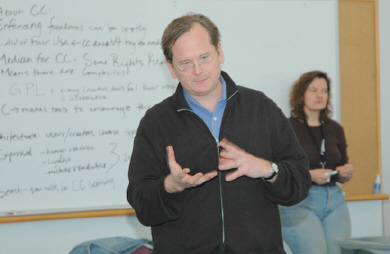Mashups and the law

During a MashupCamp session on mashups and Creative Commons, Stanford Law Professor Larry Lessig laid out the legal challenge for the digital remix/mashup culture. "There is nothing new about mashups. Humans have been doing it since beginning of human society," Lessig said. People have always shared, but the tools of the digital age enable sharing with thousands or millions of people, which is problematic today. "For the first time in history human expression by default is subject to regulation because of two architectural features," Lessig said.

Larry Lessig at MashupCamp, Mary Hodder in the background
First, the cultural objects or products created on a computer can be easily copied, and secondly the default copyright law requires the permission of the owner. The result is that by law you need permission to engage in acts of remixing. "It's bad design by copyright law," Lessig said, "and we will have to live with it for the next 20 years." He's not optimistic about changing existing regulations.
In the interim, Lessig suggested that remixers and mashup artists and hackers form pacts that make it possible to engage in creative acts, without being treated as a felon in the eyes and letter of the law. Creative Commons and other licenses, such as the GPL, are one way to mitigate the impact of the current laws.
Some mashups use screen scraping, for example, which could be seen as using someone else's content without permission. "The way the [copyright] law is architected, it's unavoidably and insanely complicated," Lessig said. "There's no way to fix it. It has to be remade."
"We need a voluntary effort by creators to hack existing system to make it better," Lessig concluded, "and education--not about framing or law--but what you can do with the technology, and then the law will catch up." He suggested trade associations--like mashup guilds--that survey practices and publish reports to establish norms or reasonable behavior in the context of the community. Those efforts could useful in establishing fair use parameters.
He also advised those who want to live in a world where they are free to remix other peoples' work, to have the same philosophy about their own work--reciprocal sampling.
The strongest medicine to resolve the situation, according to Lessig, would be working the political angle in service of updating the law for the 21st century. Anyone know any good lobbyists...?